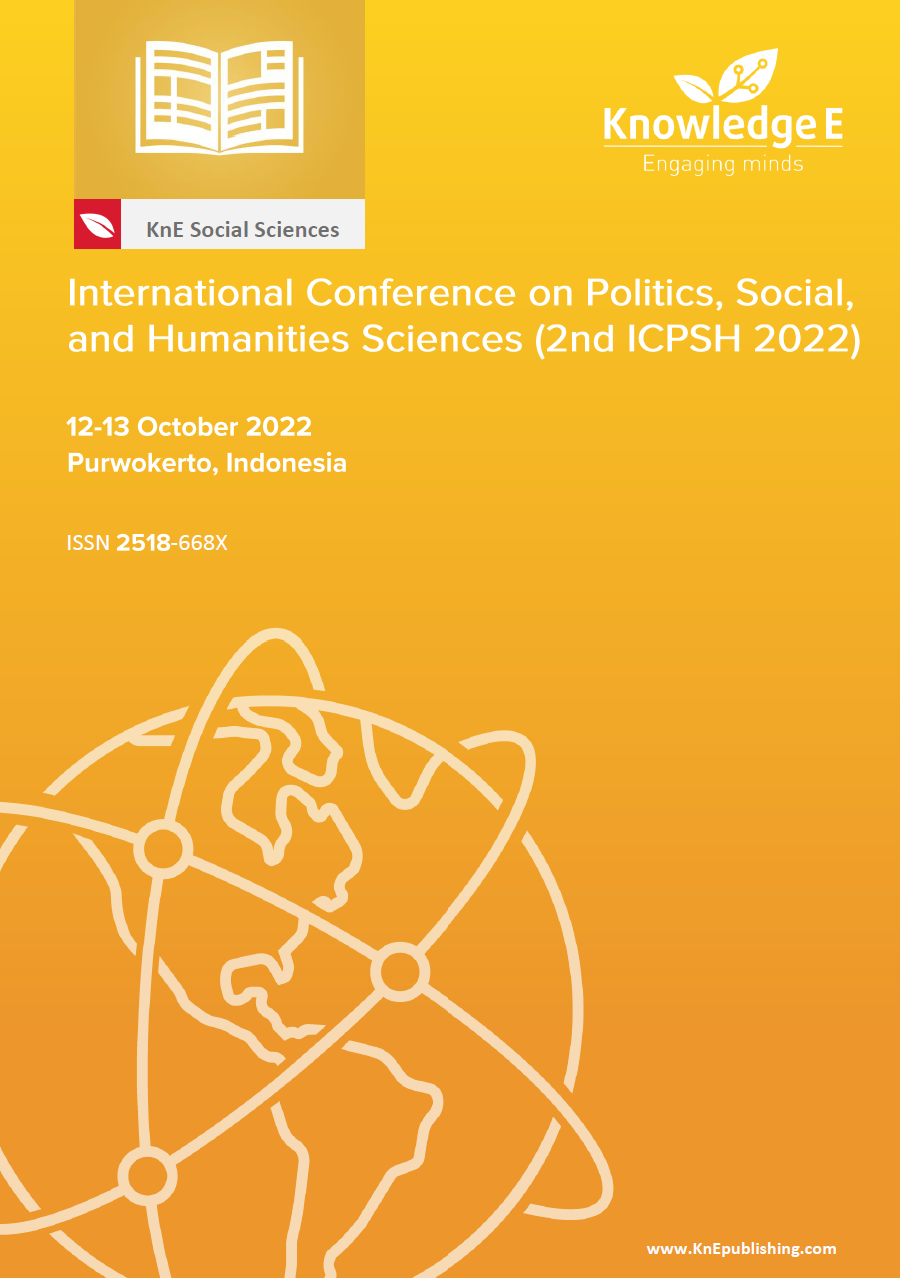Analysis of Indonesia's Loss against the United States of America in the Horticultural Trade Dispute at the World Trade Organization
DOI:
https://doi.org/10.18502/kss.v8i3.12833Abstract
This paper examined the World Trade Organization (WTO) trade dispute settlement between Indonesia and the United States of America on the horticultural issue in 2018 . The WTO aims to encourage free trade mechanisms by eliminating trade barriers, providing a negotiation forum for international trade disputes, and as a mediator to international negotiation forums on trade dispute settlement. The USA reported Indonesia to the Dispute Settlement Body (DSB) of the WTO because Indonesia was considered to have implemented a number of policies on imports of agricultural products that created trade barriers to the USA’s products. This research will explain the causes of Indonesia’s loss in the dispute by using Susan Strange’s concept of structural power. This research used qualitative methods and obtained data sources through primary and secondary data sources. Primary data was obtained directly through field study by interviewing related parties in the Ministry of Agriculture and the Ministry of Trade of The Republic of Indonesia. Secondary data was collected by conducting literature reviews of journals, books, news, and other sources. It showed that Indonesia was defeated in the dispute because it violated the quantitative restrictions rules in article XI. I GATT 1994. The USA used its knowledge structural power, such as the existence of scientific studies and research, to strengthen its case. Indonesia could not match the knowledge structure that the USA had. This was seen in Indonesia’s weaknesses in a legal capacity and inability to show facts based on research and scientific studies regarding Indonesia’s actions.
Keywords: Defeat, Dispute Settlement Body WTO, Horticultural, Indonesia, United States of America
References
Fadhillah, Ryan, (2016). Proteksi Indonesia di Sektor Hortikultura Dalam LiberalisasiPerdagangan WTO Tahun 2011 – 2013. https://media.neliti.com/media/publications/32905-ID proteksi-indonesia-di-sektorhortikultura- dalam-liberalisasi-perdagangan-wto-tah.pdf
Erwidodo, Reformasi Kebijakan Perdagangan Menuju Kemandirian Dan Ketahanan Pangan Nasional, in http://www.litbang.pertanian.go.id/buku/reformasikebijakanmenuju/ BAB
Kompas (2 Februari 2017). Sengketa Dagang dan WTO. http://apps.kmn.kompas.com/ep/CMS_PIKNET_SWALAYAN/PRINT
DS466: Indonesia — Importation of Horticultural Products, Animals and Animal Products. https://www.wto.org/english/tratop_e/dispu_e/cases_e/ds466_e.htm
Kompas (20 Februari 2013). Soal Hortikultura di WTO *Pengaturan Impor Produk Pertanian Dimungkinkan. http://apps.kmn.kompas.com/ep/CMS_PIKNET_SWALAYAN/PRINT
Kompas (22 Februari 2013). RI-AS Dialog di WTO *Petani Keluhkan Impor Sayuran yang Tidak Terkendali.
Pressreaderkompas (2017, 2 Februari), Sengketa Dagang dan WTO. https://www.pressreader.com/indonesia/kompas/20170202/281668254704825
VOA (2016, Desember 23). AS Menangkan Sengketa Dagang Besar dengan Indonesia. https://www.voaindonesia.com/a/ asmenangkansengketaperdaganganbesardenganindonesia/3647948.html
Kompas (7 Januari 2017). Peluang Banding di WTO. Accessed in April 11, 2018 in http://apps.kmn.kompas.com/ep/CMS_PIKNET_SWALAYAN/PRINT
Abdi, Usman Rianse, (2012). Metodologi Penelitian Sosial dan Ekonomi Teori dan Aplikasi. Bandung.Alfabeta.
Strange, Susan (1988), States and Markets, Continuum, London-New York
Adolf, Huala, (2004). Hukum Penyelesaian Sengketa Internasional. Jakarta: Sinar menurun Grafika.
Adolf, Huala, (2004). Hukum Perdagangan Internasional. Jakarta: PT Raja Grafindo Persada.
Suherman, (2012), Dispute Settlement Body - WTO Dalam Penyelesaian Sengketa Perdagangan Internasional. Jurnal Hukum dan Pembangunan Tahun ke-42 No.1 Januari- Maret 2012. http://jhp.ui.ac.id/index.php/home/article/view/141
WTO, DS466: Indonesia — Importation of Horticultural Products, Animals and Animal Products. https://www.wto.org/english/tratop_e/dispu_e/cases_e/ds466_e.htm
Putra, Angga Handian, (2018). Direct Interview on Monday, 9 April 2018 with the Head of Dispute Resolution Section, Ministry of Trade of the Republic of Indonesia.
Yekti, Septian Nur, (2017). Kebijakan Developmental State Indonesia dalam Perdagangan Komoditas Hortikultura, Hewan, dan produk Hewan. IP Indonesian Perspective Vol.2, No.1 ( Januari-Juni 2017), page. 1-84, http://ejournal.undip.ac.id/index.php/ip/article/view/15537
Kompas (2016). Sengketa Impor Produk Hortikultura, Hewan, dan Produk Hewan. http://apps.kmn.kompas.com/ep/CMS_PIKNET_SWALAYAN/PRINT
Suardi, & Mallawa, (2012), Pengaturan World Trade Organization Dalam Hukum Internasional Serta Konflik Kepentingan Antar Negara Maju dan Negara Berkembang. Jurnal INSPIRASI, No XIII Edisi Januari 2012.
M.liputan 6.com (18 Juni 2016). Meksiko Stop Sementara Impor Udang dari Indonesia, http://m.liputan6.com/amp/2534425/meksiko-stop-sementara-imporudang- dari-indonesia
Suherman, Ade Maman, (2014). Hukum Perdagangan Internasional Lembaga Penyelesaian Sengketa WTO dan Negara Berkembang. Jakarta: Sinar Grafika.
Kontan.co.id (14 September 2017). Nasib Tiga Komoditas ini Terganjal Ekspor ke AS https://industri.kontan.co.id/news/nasib-tiga-komoditas-ini-terganjal-ekspor-ke-as
Fauzi, Ahmad Romdhan, (2018). Direct interview on Thursday, 12 April 2018 with Recommendation Service officer of Directorate of Horticultural of Republic of Indonesia.

